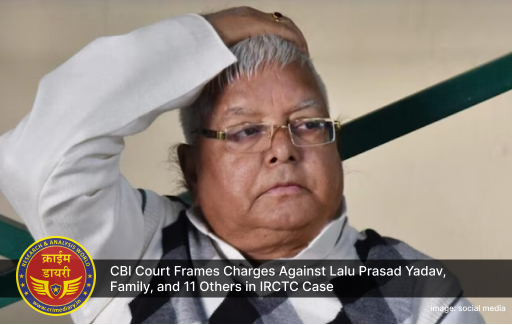CBI Court Frames Charges Against Lalu Prasad Yadav, Family, & 11 Others in IRCTC Case
Rabri Devi and Tejashwi Prasad Yadav are charged with criminal conspiracy and cheating.by: Sudam Pendhare

New Delhi (13 Oct. 2025) - A special CBI Court today formally framed charges against former Railway Minister Lalu Prasad Yadav, his wife Rabri Devi, son Tejashwi Prasad Yadav, and 11 other accused in the alleged Indian Railway Catering and Tourism Corporation (IRCTC) corruption case, setting the stage for a full-fledged trial.
The court found sufficient grounds to proceed against all 14 individuals and two companies in the case, which stems from alleged corruption in the award of contracts for the leasing of two Railway Hotels, the BNR Hotels at Ranchi and Puri.
Key Accused and Charges:
Case Background: Land-for-Hotels Allegation
The Central Bureau of Investigation (CBI) registered the case on July 5, 2017, alleging that during his tenure as Minister of Railways (2004-2009), Shri Lalu Prasad Yadav entered into a criminal conspiracy to favour SHPL in awarding the contract for the operation and maintenance of the two BNR Hotels.
The alleged quid pro quo involved a high-value, prime land parcel in Patna being sold by the Kochhar brothers to a company, M/s Delight Marketing Company Private Limited (DMCPL), run by a close aide, Prem Chand Gupta. DMCPL, now known as LARA Projects LLP, was later allegedly taken over by Lalu Yadavs family members, Rabri Devi and Tejashwi Prasad Yadav, at a fraction of its market price, effectively bringing the valuable asset under their control.
Trial Schedule Set
The Court has now scheduled the case for the commencement of prosecution evidence, which will be heard on a day-to-day basis from October 27, 2025, to November 7, 2025.
All accused pleaded not guilty to the charges, maintaining their stance that the tenders were awarded transparently and that the charges are politically motivated. The framing of charges comes ahead of the upcoming Bihar Assembly elections, a development that is expected to intensify the political discourse in the state.


 Upload News
Upload News